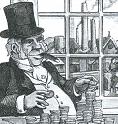|
Is Communism good? This poll is closed. |
|||
|---|---|---|---|
| Yes |
|
375 | 66.25% |
| No |
|
191 | 33.75% |
| Total: | 523 votes | ||
|
504 posted:I like how you completely ignore the 30 million death toll. You know, how I said believers always do in the text you quote. please stop completely ignoring the 205 million death toll of capitalism in all your posts in this thread, you loving monster
|
|
|
|

|
| # ? May 10, 2024 00:55 |
|
my uncle told me stalin killed a trillion people
|
|
|
|
is the 'death toll of capitalism' literally every person who has ever died at the hands of anyone who wasnt a communist lol
|
|
|
|
hakimashou posted:is the 'death toll of capitalism' literally every person who has ever died at the hands of anyone who wasnt a communist lol I mean, that's how the death toll of communism works.
|
|
|
|
RBC posted:i don't know, why don't you ask any number of unionized workplaces that decide things like this based on seniority how they function. you can start with ford I'm pretty sure Ford doesn't pay all their employees a uniform hourly rate. One of the main benefits of seniority is usually increased pay. White Rock posted:You mean the problem most office jobs have where the employers are being payed to browse reddit and masturbate in the bathroom? Hmm, how do employers solve that now again? I'm asking a lot of questions because people are proposing an economic theory that claims to answer them. As for your questions: 1.) People are trapped in meaningless jobs they hate, because there are a lot of meaningless jobs they hate which generate value to society. 2.) Most laborers in the third world work long shifts in bad conditions because their countries aren't very developed yet, and in most cases the alternative is subsistence farming which is usually an even worse job. As countries develop, working conditions tend to improve. 3.) Research is done on curing baldness and impotence and on preventing/treating malaria. If you have a problem with people tackling multiple issues at once, then I'm not sure why you're posting on the internet. 4.) Nations have been slow to tackle climate change because its a tragedy-of-the-commons problem. Its also a difficult problem to solve, with no cheap or quick solution. Despite this, substantial progress on climate change has been done over the last decade, we just need to do a lot more than that. 5.) Wages have stagnated In the first world (they've grown a lot in much of the third world) largely because of an increase in the supply of people who can work due to third world countries entering into international trade, and a relative decrease in the number of people needed to perform many jobs due to automation. This is exacerbated by the fact employers also have a systemic advantage in negotiating wages over employees, this can be offset somewhat by effective unionization. 6.) The business cycle (the cyclical expansion and recession of the economy) is a natural phenomenon in an economy, the fact that we regularly have recessions is not indicative of an unhealthy economy. One of the goals of good governance is to act as a buffer on the cycle, by using fiscal policy to cool off the economy when its expanding too much, and by using government spending to stimulate the economy when its in recession. Another goal of good governance is to build effective social safety nets which insulate vulnerable people from the swings in the cycle. 7.) In my opinion, the root cause for the dismantling of social safety nets is largely xenophobia. Most social safety nets are created in exclusionary environments, and most calls to cut them come only after excluded groups have been included. With the exception of a few Randian ideologues, most of the calls to cut social programs come from populist movements who believe in stopping some undeserving other from stealing your hard work.
|
|
|
|
OwlFancier posted:I mean, that's how the death toll of communism works. seriously, they often include Nazis killed by the Red Army in the "DEATH TOLL OF COMMUNISM" numbers
|
|
|
|
Hakimashou, have you ever heard of Pascal's wager? Because you better change your beliefs real quick, for when the Revolution comes.
|
|
|
|
I'm sure once human genetic engineering becomes more prevalent there will be Unificationists that desire to genetically modify tribalism out of humanity itself. They would see prior implementations of communism as a nightmare of genetic inequality. Communism ignores the natural human tendency towards tribalism and only attempts to fix it on the class level, not the genetic level. Modern socialists only desire punishment for genetic discrimination (racism, sexism), not making it impossible itself. No amount of education can change the realities of genetic diversity, as long as it exists there will be genetic discrimination. Radical leftists consider older forms of leftism as immoral, so why would communism be any different to future leftists? MicronAle fucked around with this message at 08:48 on Jan 27, 2017 |
|
|
|
MicronAle posted:I'm sure once human genetic engineering becomes more prevalent there will be Unificationists that desire to genetically modify tribalism out of humanity itself. They would see prior implementations of communism as a nightmare of genetic inequality. Communism ignores the natural human tendency towards tribalism and only attempts to fix it on the class level, not the genetic level. Modern socialists only desire punishment for genetic discrimination (racism, sexism), not making it impossible itself. No amount of education can change the realities of genetic diversity, as long as it exists there will be genetic discrimination. I'm OK with this, as long as every other human being is a clone of myself. In our glorious genetically engineered future, I'll suck my own cock all day every day.
|
|
|
|
Flowers For Algeria posted:Hakimashou, have you ever heard of Pascal's wager? Better dead than red. 
|
|
|
|
TomViolence posted:Oh, poo poo, the human nature argument, marxism's only weakness. It pretty much has been considering that any attempt to try communism on a larger scale than a single tiny commune has resulted in a third world shithole.
|
|
|
|
Sun Wu Kampf posted:It pretty much has been considering that any attempt to try communism on a larger scale than a single tiny commune has resulted in a third world shithole. Yeah, it went the other way around in the Soviet Union.
|
|
|
|
hakimashou posted:Better dead than red.  the gulag then the gulag then
|
|
|
|
My primary theoretical hang-up on Marxist communism is the dictatorship of the proletariat; I am not convinced it is ever possible to move beyond that stage, and that it will always fail because the balance between a true workers' state and a degenerated one is too precarious. Marxism-Leninism seems fundamentally flawed, because the central authority together with state capitalism creates a massive incentive for anyone with any intelligence and ambition to be involved in the state apparatus, and this will create a feedback loop where the state continues to consolidate power, ultimately dissolving universal democracy; control can never be in the hands of the workers, and the path of the state depends entirely on the interests of the ruling class, which isn't any better than welfare capitalism in the end. I'm not sure what form a more purestrain Marxist transition would take, but until the answer is "anarchism," I still have the concern that centralized decision-making supports ever strengthening, rather than weakening, the centralized undemocratic state. Any thoughts or essays on this that address anarcho-communist concerns?
|
|
|
|
It comes down to the fact that capital power and money power are not special types of power. Concentrated power is a threat in all forms. Something perfectly exemplified by the failures of real life socialist experiments.
|
|
|
|
BRAKE FOR MOOSE posted:My primary theoretical hang-up on Marxist communism is the dictatorship of the proletariat; I am not convinced it is ever possible to move beyond that stage, and that it will always fail because the balance between a true workers' state and a degenerated one is too precarious. open sourced projects like wikipedia show that decentralized open participation projects can work
|
|
|
|
Sun Wu Kampf posted:It pretty much has been considering that any attempt to try communism on a larger scale than a single tiny commune has resulted in a third world shithole. That seems like an apples to oranges comparison. Russia went from being the sick man of Europe to a world-dominating superpower. China went from a backwards country being torn apart by colonialism to a giant on the world stage. While it adopted more of a hybrid approach, you can say much the same about India.
|
|
|
|
Commie NedFlanders posted:open sourced projects like wikipedia show that decentralized open participation projects can work PLEASE PLEDGE £5 A MONTH TO KEEP THE SYNDICALIST UTOPIA ALIVE.
|
|
|
|
My idea is changing the name Communism into Conservatism because stupid people will believe it when I display a right-wing attitude with a secret left-wing agenda.
|
|
|
|
Dudes the commie death toll was only like 20 million, not 30 million, because those nefarious statisticians were just counting any ol death. So, bear this in mind.
|
|
|
|
BRAKE FOR MOOSE posted:Any thoughts or essays on this that address anarcho-communist concerns? I always tell my anarchist comrades that I'm fully planning on becoming an anarchist as soon as every state on the planet is a socialist one
|
|
|
|
White Rock posted:I can recommend Towards a new Socialism by Paul Cockshott and Allin Cottrell for a great analysis of a potential socialist economy. Lots of tables and equations for those interested. I leafed through this book since it's freely available. It seems like it'd build a DDR-like system with all the black markets, coercion and problems that existed in that arguably most successful communist system. The book is hilariously blind to its own stupid ideas. One of the main purposes of economic policy is to make sure people are employed, but there's no way to really control whether people do a good job. Threat of getting fired is irrelevant because you're essentially guaranteed another job and working harder doesn't earn you anything extra. The book makes the same lame plead you did: people would want to work harder because communism. The book also doesn't mention queues as far as I could see (although to be fair, I didn't read everything). You basically have two ways to control demand: prices or queues. If prices are fixed queues will form. If you think this is a good idea, you're a silly willy. For modern day implementations, check the queues in Scandinavian health care systems (for an optimistic example) or for pretty much anything in Iran (not-so-nice). Scarcity will always be our friend, post-scarcity is a pipe dream. Some of the proposed solutions are really funny. Prices of everything are updated on Teletext TV (nowadays they'd probably use Internet) every 20 minutes. Much more efficient and precise than anything the capitalist system has ever achieved. Also people would stockpile literally anything that is wanted but not produced enough. Historically when people went to a disco in DDR it'd take a couple hours just to greet everyone you knew,. You had to have extensive networks to be able to find people who had what you wanted and people who wanted what you had. I assume there's be a secret police to combat this sort of thing. Owning foreign currency would be forbidden so you'd be trapped inside system with no way to bring anything of value with you as you defect. I assume defecting would be severely punished as well. I'm only wondering why you believe people would like to live in a system like this or why it's something to strive for? And as long as we're discussing utopian systems, I think the Christians have a better utopia than you do. Jesus Christ descending from the heavens and building an everlasting paradise on Earth sound a lot better than a lifetime of working for the state. Hob_Gadling fucked around with this message at 22:06 on Jan 27, 2017 |
|
|
|
Hob_Gadling posted:I leafed through this book since it's freely available. It seems like it'd build a DDR-like system with all the black markets, coercion and problems that existed in that arguably most successful communist system. The book is hilariously blind to its own stupid ideas. One of the main purposes of economic policy is to make sure people are employed, but there's no way to really control whether people do a good job. Threat of getting fired is irrelevant because you're essentially guaranteed another job and working harder doesn't earn you anything extra. The book makes the same lame plead you did: people would want to work harder because communism. I myself find it hilarious that the best counter argument against it you can come up with is that people will not work unless under threat of starvation or greed. That mankind is poisoned at its core and if you don't hover a sword of Damocles over everyone heads there everything would fall apart, that you need immediate danger to whip the lower classes into shape. No wonder so many capitalists are closet fascists. Also, being from one of those terrible Scandinavian health care systems, i can tell you it's no biggie, and i much prefer having a cap of 300 € a year for medical expenses rather then running the risk of having too declare medical bankruptcy. I really couldn't consider living in the third world country called USA.
|
|
|
|
that guy is basically saying its a good thing people are starving and don't have homes because then it's better for everyone else also people without healthcare, apparently
|
|
|
|
Secular Humanist posted:Dudes the commie death toll was only like 20 million, not 30 million, because those nefarious statisticians were just counting any ol death. So, bear this in mind. how many deaths from capitalism
|
|
|
|
White Rock posted:I myself find it hilarious that the best counter argument against it you can come up with is that people will not work unless under threat of starvation or greed. That mankind is poisoned at its core and if you don't hover a sword of Damocles over everyone heads there everything would fall apart, that you need immediate danger to whip the lower classes into shape. No wonder so many capitalists are closet fascists. People react to incentives. The system in the book removes incentives and gives nothing to replace them except a warm fuzzy feeling that you're doing the Right Thing and coercion. Some would work because they enjoy it but most wouldn't. Working is something we do because we must. quote:Also, being from one of those terrible Scandinavian health care systems, i can tell you it's no biggie You misunderstood my point apparently. The point is that limited supply is regulated by prices or queues. The book wants to remove price as a mechanic. What do you think happens when you do that? Being a social democrat, I believe health care is one of the main functions of a welfare state and it should (mostly) not be privatized, so please don't bring that strawman up again.
|
|
|
|
Hogge Wild posted:I don't think that it is. you're wrong, OP.
|
|
|
|
German communists disliked the fact that Lenin encouraged violence for his revolution, instead of a peaceful transition. Lenin and Stalin weren't Marxist, they were violent opportunists. There has never been a communist government.
|
|
|
|
Hob_Gadling posted:People react to incentives. The system in the book removes incentives and gives nothing to replace them except a warm fuzzy feeling that you're doing the Right Thing and coercion. Some would work because they enjoy it but most wouldn't. Working is something we do because we must. Incentives are just negated coercion. Also, money is scientifically the worst kind of way to incentive mental tasks. People react way better to feeling like they are doing something meaningful, that they have control over their life or expressing themselves. This idea that nobody would want to be a doctor unless they were paid more then average wage is ludicrous. If your not convinced, the book specifically addresses the potential need to give extra incentive's to jobs with high risk of injury or if there is a shortage in a critical field. Also, coercion is like the biiiig game of capitalism. Benefits withdrawn if you don't move to this place where there are jobs, losing healthcare, potential homelessness and eventual starvation for those lacking social nets. Capitalism is if anything the king of coercion, not incentives. Hob_Gadling posted:You misunderstood my point apparently. The point is that limited supply is regulated by prices or queues. The book wants to remove price as a mechanic. What do you think happens when you do that? If you actually read the book, you would know that it doesn't disqualify the raising of prices to balance supply and demand of goods. It places it in context with market subsidies and rationing. Chapter eight, like three pages in. Hob_Gadling posted:Being a social democrat, I believe health care is one of the main functions of a welfare state and it should (mostly) not be privatized, so please don't bring that strawman up again.
|
|
|
|
White Rock posted:Incentives are just negated coercion. As communism is a joyless ideology, I can see why someone would think this. It's not true, though. You yourself give an example of an incentive: people will do things if they believe them to be meaningful (such as studying to become a doctor). quote:If you actually read the book, you would know that it doesn't disqualify the raising of prices to balance supply and demand of goods. It places it in context with market subsidies and rationing. Chapter eight, like three pages in. Right, yes. Let me quote: Towards a New Socialism posted:Market-clearing prices are prices which balance the supply of goods (previously So you are right, it does mention queues. But doesn't "market-clearing prices" sound suspiciously like market pricing, where you put an arbitrary price on top of the labour value? Even the book says: code:quote:Every single social democratic state has turned centrist, that ideology if any has failed. Former social democratic states are currently dismantling their welfare systems to feed the fires of capitalism. I'm sorry, I thought you said you "much prefer having a cap of 300 € a year for medical expenses rather then running the risk of having too declare medical bankruptcy". Don't worry, Jesus is coming soon and then we won't need healthcare anymore as all disease is eradicated.
|
|
|
|
Bitter fly posted:German communists disliked the fact that Lenin encouraged violence for his revolution, instead of a peaceful transition. Lenin and Stalin weren't Marxist, they were violent opportunists. There has never been a communist government. Eh, bits and pieces. Noted shithead Tristram Hunt did a study into whether there was a link between Marx & Engels' works and Leninist theory and while he surmises that Lenin used a Marxist framework, there is nothing within the works of Marx and Engels that necessary leads to Lenin's conclusions. That's why Marxist-Leninism is specified for Leninist theory. Of course you then get the splits between people who think Trotsky's anti-Leninist revisions mark the truest form of Marxist-Leninism, whether Stalin's iron fist approach showed the true spirit of Marxist-Leninism or whether both were wrong.
|
|
|
|
Bitter fly posted:German communists disliked the fact that Lenin encouraged violence for his revolution, instead of a peaceful transition. Lenin and Stalin weren't Marxist, they were violent opportunists. There has never been a communist government. Also, it is debatable humans can achieve a communist government either. Both Lenin and Stalin were both Marxists, and very clearly products of the late Tsarist period. Violence was a way of life at that time, and both the Reds and the Whites spoke in the same language. If anything late Tsarist Russia was a darwinist challenge where only the most radical and violent groups could survive. On a broader note, I do have a issue with calling the USSR state capitalist. If you don't want to call it communist or even socialist fine... (I guess) but we have present-day examples of functional state capitalism in an arch-typical form (Russia/China) that look very different than Marxist-Leninist states. Whatever the USSR was, it was more than state capitalist even if it clearly failed in its ideological intentions. Also, the best solution is rationing during war time/emergencies and eventually allowing a mix of subsidies/market pricing during period of stability.
|
|
|
|
Hob_Gadling posted:incentive: people will do things if they believe them to be meaningful (such as studying to become a doctor). Okay you are just too full of contradictions to understand... You reject people being motivated to do work because they are doing a good thing. Hob_Gadling posted:The system in the book removes incentives and gives nothing to replace them except a warm fuzzy feeling that you're doing the Right Thing ----- Hob_Gadling posted:But doesn't "market-clearing prices" sound suspiciously like market pricing --- Hob_Gadling posted:I'm sorry, I thought you said you "much prefer having a cap of 300 € a year for medical expenses rather then running the risk of having too declare medical bankruptcy". The very post your actually quoting posted:Former social democratic states are currently dismantling their welfare systems to feed the fires of capitalism. 
|
|
|
|
White Rock posted:You reject people being motivated to do work because they are doing a good thing. No, it's great if you can find a meaningful thing to do. It's just not the only incentive why people work, and it's not even the main one. People work because they get paid. Trivial test for this is to ask people what they would do if they won the lottery. Not many would stay at their job. Some would, but not many. Most would go and do other things they find fulfilling. quote:Yes, they are similar too market prices. Right, so we're back to the East German system. Stuff that people want only exists in black market as it's bought quickly off the shelves, other things people want are behind a huge queue.
|
|
|
|
I think it should be obvious that full employment policies did in fact not cause labor to slack off at work any more than NAIRU-targeting economic policies. Is there a reason to believe that socialist full employment would function differently from Keynesian full employment? Tragedy of the commons also has the requirement that the individuals have private property that they accumulate by abusing their common property. In worker directed enterprise, it's the company rather than you as an individual that gets the short-term gain when you abuse the company, so the workers have no incentive to compete on who gets the most squeezed out of the company for themselves before it breaks down. It's actually the opposite historically, capitalist enterprise is more fragile. You can also have effective organization without hierarchy: organize the roles democratically, through negotiation or in a round-robin fashion between capable candidates. Techniques for this have been successfully pioneered by real organizations, partially even in low-hierarchy capitalist companies. Basically communism may be utopian and the leap from capitalism to it can fail in a myriad of ways, but from capitalism to a basic market socialist system? Just give the workers right of first refusal on company sales and offer loans to worker collectives on the condition that they reform their company as socialist. Start a huge investment program in socialist enterprise that freed them from paying bank interest rates. I doubt that anybody except the bourgeoisie would feel threatened by that or want to roll it back, especially if you did it during an economic downturn. What I'm really saying is that people hate the values of capitalism and keeping up the veneer of capitalism being the only efficient system is the main reason that capitalism stays as the dominant way to do business in a democratic society. The capitalist class is a leech that would cause the eventual defeat of capitalist enterprise against socialist enterprise in fair competition, and they know it. Just extrapolate from that, and communism is good. Otherwise my argument is just a pipe dream that makes ridiculous assumptions like a meaningfully democratic capitalist society and the liberal state consistently attempting to equalize the starting positions of promising businesses rather than propping up a few bourgeois clients. uncop fucked around with this message at 12:08 on Jan 28, 2017 |
|
|
|
uncop posted:I think it should be obvious that full employment policies did in fact not cause labor to slack off at work any more than NAIRU-targeting economic policies. Is there a reason to believe that socialist full employment would function differently from Keynesian full employment? So basically poo poo that Corbin is pushing and the Democrats need to get on board with.
|
|
|
|
Anyone who thinks Capitalism is highly efficient has never worked for a large company in a capitalist society.
|
|
|
|
I like reading about Communist history and theory because it is both bat poo poo insane and refreshingly idealistic. A few things stuck out to me... As an economic system, creating "quotas" handled by bureaucrats that could potentially live hundreds or thousands of miles away from you was a disaster. In fact, collective ownership of farms got so bad, that "snipping" was common - peasants would go out at night to snip ears of corns because they knew that during the day, none of their labor would translate into any sort of gain for themselves. They were of course arrested for undermining revolutionary ideals. Of course, everyone knows about the Great Leap and the 5 Year Plan so I'm not even gonna go there. Having a command economy mixed with a heavily bureaucratized Party structure seems like a bad idea from the outset, but here we are. As an international call to fellow workers, homegrown communists revolutions quickly fell apart, mostly due to the influence of the insane leadership in Moscow. But why? Communism does not have a systematic way of dealing with dissent. If you do not actively support the dictatorship of the proletariat, you are a counterrevolutionary and must be arrested, maligned or shot. Even after WW2, when nations were tired and looking for alternative ways of conducting government, communism never fully reached overwhelming popular support, except in a few places. So, how to maintain power? Easy, you take on the Bolshevik model and ruthlessly suppress dissent. Otherwise, you lose your newly created government once democracy takes action against you. As a political system, there are no checks and balances. Judicial/executive/legislative powers are the Party themselves - and the Party is effectively controlled by one person, out of sheer necessity. Alternative parties cannot exist, or if they do, just for show, because the goal of the Party is to eventually dissolve the state altogether. Until then, only the sage advice of the Party can help the uneducated working man and peasant to get there - the dictatorship of the proletariat is being worked on by the Party's behalf. That makes any social mobility almost necessitate being a Party member, and we slowly devolve into kleptocracy as human nature inevitably takes over. As an individual living in a communist society, there is no room for aberration. The amount of human rights abuses were staggering...Millions arrested to fill quotas, the mass migrations of entire peoples like the kulaks and muslims to gulags, the crackdown on counterrevolutionary thought, and the stifling of normal thought like religion and arts. One positive that did come out was the new access to universities that peasants never had under the Tsarist regime - however, even with this education, you need that sweet Party stamp of approval. Hence the creation of the Nomenklatura, the privileged class. Imagine having to be a registered Republican to become a doctor. From a pure philosophical point of view, Marxism is fascinating. Marx was a genius, someone who had an extremely sharp eye for social injustices. His folly, atleast in my opinion, is taking Hegel too seriously. The dialectic, or this vague idea that history moves in the same way that ethics and ideas do via the synthesis, allowed him to neatly explain away all practical issues of implementing his system in the real world. If history is on the side of the stateless society, then anything is permitted to get there. On the other hand, his analysis of labor exploitation is absolutely spot on, and is still a problem today. Labor never gets their fair share, because if they did, owners would not receive any profit. So, is it possible that all of the above weren't "true" communism? Maybe. Perhaps if the Mensheviks prevailed over the Bolsheviks, the world would be a lot different. Perhaps we have no example of true communism to really compare to. If that's the case, I'd argue that the US isn't even close to as capitalist as people would claim. We have social security, we subsidize commodities, we bail out banks and industries, we mandate healthcare, we have public education, we have public works and utilities, etc, etc. The key difference between us and the Nordic states is that we believe subsidizing industry is better than subsidizing labor itself, which I do disagree with. We are not a capitalist society, as the USSR was not a communist society. Maybe a true capitalist society in the Randian sense is just as much of a utopia as the communists think a stateless self-contributing series of communes would be. So is communism good? No. Is capitalism good? No. Democratic socialism is the only form of government that makes sense to me, but I'd be arrested in the Soviet union if I said that for being a counterrevolutionary. dk2m fucked around with this message at 17:14 on Mar 2, 2017 |
|
|
|
A capitalist system is defined by the working class's relation to the means of production, as is a communist system. Things like healthcare, social security and state intervention in the economy can exist in both capitalist and communist societies and are more explicitly associated with social democracy than anything else, they're nice to have but are often irrelevant to the larger question of who holds the economic power in a given society. The soviet project, with its concentration of political and economic power in the hands of an elite, came no closer to realising communism than nazi germany came to realising socialism. The Soviet Union was also avowedly democratic, but was manifestly not so. Just because something claims to be the embodiment of an idea does not mean it is representative of that idea and we should not conflate the Soviet Union with the many competing models for communist organisation. Marxism-Leninism's successes in the twentieth century were due to the same factors that constrain it from actually realising a communist society: its authoritarianism, its retention of the Westphalian nation-state, its necessary compromise and co-dependence with the capitalist nations of the world, the siege mentality that created the worst paranoid excesses of Stalinism - all these things are inextricably intertwined with Marxist-Leninist thought and undercut much of whatever progress it actually made. In a modern context, after the fall of the Soviet Union, socialists and communists must look at the Soviet Union as a model of what not to do. Rather than defend or rehabilitate it, it's imperative to actually understand how and why it failed and incorporate those lessons into a new model going forward, one that is actually equipped to deal with the new circumstances of the 21st century, in which labour power and mass politics are all but dead, identity is atomised and deterritorialised and the voracious, shambling carcass of capitalism co-opts and appropriates all revolutionary ideas in a bastardised form from the very moment of their utterance. Which is a bit of a big ask, since our generation grew up as world communism was collapsing, social democracy was falling into retreat and the new neoliberal order began asserting itself as the only model through which we can understand our reality. The left is great at critique, it can find the problem in anything. The real problem is the poverty of imagination we have now in looking at solutions, our worldviews almost from birth are coached into a capitalist realist mode of thinking that constrains us from seeing beyond its horizons.
|
|
|
|

|
| # ? May 10, 2024 00:55 |
|
Private ownership and control of the economy is immoral. Our E: oops The Kingfish fucked around with this message at 18:46 on Mar 3, 2017 |
|
|



























